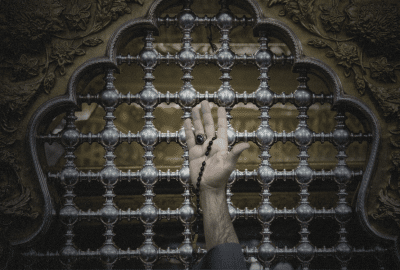Recommended Acts for the Day of Ashura
The Day of Ashura is one of the most sacred days in the Islamic calendar.
It is the day that saw the martyrdom of Imam Hussain (as), the grandson of the Holy Prophet Muhammad (saww), and his loyal companions in the land of Karbala.
Read more about the Battle of Karbala here.
While our hearts weep for these tragic events, Ashura is also a time for deep spiritual devotion. It’s a day of worship and recommitment to the values Imam Hussain (as) died for: truth, dignity, and unwavering faith.
Here’s how you can honour this day.
Acts of Worship on the Eve of Ashura
On the night before the 10th of Muharram – the Eve of Ashura – Imam Hussain (as) and his companions prepared for battle with faith, spending the entire night in worship.
You can follow in their footsteps by:
- Staying awake in worship, just as they did, immersed in the remembrance of Allah (swt).
- Reciting the Holy Quran, and reflecting on its meanings.
- Praying two units of prayer twice (2×2), and in each rak’ah reciting Surah al-Ikhlas 50 times after Surah al-Fatiha.
- Offering Salat al-Layl (the Night Prayer) – a powerful act of closeness to Allah (swt).
These acts are opportunities to strengthen your soul and to spiritually align with the path of the Ahlulbayt (as).
Acts of Worship on the Day of Ashura
The Day of Ashura is a day of profound grief, reflection, and mourning.
- Refrain from food and drink until afternoon, to empathize with the thirst and suffering of the camp of Imam Hussain (as). Note: this is not considered a fast.
- Recite Ziyarat Ashura, a powerful devotional visitation that invokes our connection to Imam Hussain (as), his companions, and the tragedy of Karbala.
- Attend majalis and engage in Husayni rituals with sincerity.
- Recite the Quran and allow its words to deepen your understanding of sacrifice, faith, and divine justice.
Let yourself weep. The tears shed for Imam Hussain (as) are beloved by Allah (swt) and a sign of a heart connected to truth and justice.
Make This Day Worthy of the Legacy of Imam Hussain (as)
Imam Hussain (as) gave everything on the Day of Ashura.
Ashura isn’t just a moment in history – it’s a call to live a life rooted in truth, dignity, and faith.
What does Hussain (as) mean to you?
Put the Legacy of Karbala into Action
This Muharram, let your remembrance lead to genuine transformation.
Keep the message of Karbala alive through long-term, life-changing projects.
Your contribution builds a lasting legacy of Karbala for generations to come.
By giving in the name of Imam Hussain (as), you honour his mission – one of faith, justice, and dignity.
Frequently Asked Questions (FAQs)
The Day of Ashura, observed on the 10th of Muharram in the Islamic calendar, commemorates the martyrdom of Imam Hussain (as), the grandson of Prophet Muhammad (saww), and his companions in the Battle of Karbala. It is a day of mourning, reflection, and spiritual recommitment to values like justice, truth, and faith.
On the night before Ashura, it is recommended to:
- Stay awake in worship and remembrance of Allah (swt)
- Recite the Holy Quran and reflect upon its meanings
- Perform two units of prayer twice, reciting Surah al-Ikhlas 50 times in each rak’ah
- Offer Salat al-Layl (the Night Prayer) for spiritual closeness and introspection
These practices echo the devotion shown by Imam Hussain (as) and his companions before battle.
On the 10th of Muharram, it is highly recommended to:
- Abstain from food and drink until afternoon (this is not a formal fast)
- Recite Ziyarat Ashura, a deeply moving devotional text
- Attend majalis (gatherings of remembrance)
- Reflect through recitation of the Quran
Let yourself weep and mourn – the tears shed for Imam Hussain (as) are honored by Allah (swt)
Fasting on Ashura is not obligatory for Shia Muslims. Instead, many choose to abstain from food and drink until the afternoon to spiritually connect with the thirst and suffering experienced by Imam Hussain (as) and his family in Karbala.
Ziyarat Ashura is a devotional prayer recited to express love for Imam Hussain (as), condemn his oppressors, and reaffirm one’s commitment to his cause. It strengthens the spiritual bond between the reciter and the mission of Karbala.
You can honour Imam Hussain (as) by supporting causes that reflect his values of justice and compassion. This includes:
- Donating to build masjids or health and sanitation infrastructure
- Sponsoring orphan homes or water wells
- Giving in the name of Imam Hussain (as) to support the vulnerable and uphold dignity
Charity in his name transforms mourning into meaningful legacy.


 Donate Now
Donate Now
 Donate
Donate









